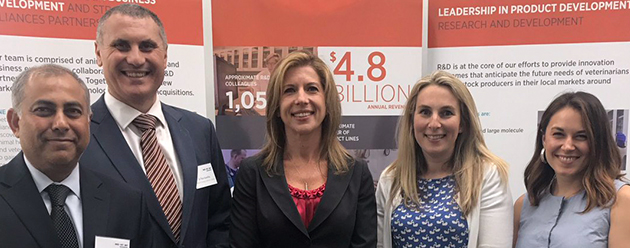
Zoetis Collaborates for a One Health Approach at 5th Med-Vet-Net Conference
July 12, 2017
At the end of June, Zoetis joined 19 industry partner organizations at the University of Surrey’s School of Veterinary Medicine for the fifth Med-Vet-Net Association conference.
At the end of June, Zoetis joined 19 industry partner organizations at the University of Surrey’s School of Veterinary Medicine for the fifth Med-Vet-Net Association conference. Med-Vet-Net was officially launched in October 2009 from the European Union Sixth Framework Programme as a Network of Excellence for zoonoses research. Partners of Med-Vet-Net represent national medical and veterinary institutes from 14 EU member states. They are focused on integrating human health with food and veterinary sectors, emphasizing food-borne zoonoses.
A One Health Approach
The two-day program was themed, “One Health: Zoonoses Emerging Threats,” and drew 150 attendees with featured speakers from private, academic and government sectors. Presentations were on four key topics:
- Epidemiological Surveillance and Outbreak Control of Zoonoses
- (RE-)Emerging and Neglected Zoonotic Agents
- Big Data and Digital Information
- Antimicrobial Resistance
On the first day of the meeting Zoetis’ Mahesh Kumar, Vice President, Global Biologics Research, shared learnings from Zoetis’ avian influenza vaccine development, highlighting the benefits of human and animal health working together: “We have many diseases that cross over from human-to-animal and vice-versa. A network such as the Med-Vet-Net that fosters the concept of One Health allows us to take advantage of the learnings we get from both parties. In animal health we can progress things much more quickly – and we are able to share those findings with our human health partners.”
Collaboration is Key to Digital Innovation in Animal Health
The need for collaboration to create new research, education and commercial opportunities was emphasized throughout the agenda. The vHive Partnership for Innovation, of which Zoetis is a member, was discussed as an example of symbiotic public-private partnership. Professor Alex Cook of the University of Surrey explained, “There are three major benefits of our partnership: First, the rigor of working with a commercial company; second, we can conduct research and test technologies that don’t cost Zoetis time; and third, the model under which we operate.”
The University of Surrey and Zoetis came together to develop the multidisciplinary research program that includes the 5G Innovation Centre, the Centre for the Digital Economy in the Surrey Business School and the new School of Veterinary Medicine.
“Partnering with Zoetis allows the Centre to have access to the company’s world-class capacities in developing innovative products and services and in translating new technologies into valuable tools for their customers,” added Professor Cook.
Zoetis Vice President, Business Development and Commercial Alliances, Rimma Driscoll, opened the meeting on the second day with a presentation about Zoetis’ commitment to digital innovation in animal health. “With the right technologies and innovations from partners like Zoetis, we can help farm animal producers balance the growing demand for animal protein. Digital innovations for animal health are only enhanced – and accelerated – through strategic partnerships and consortia like Med-Vet-Net. Thanks to these critical alliances, the potential to better protect both animals and people from the spread of zoonotic outbreaks is within our control because the technology is well within our reach.”
This meeting was a great opportunity for Zoetis to continue the One Health conversation. “By participating in Med-Vet-Net, we aim to improve the prevention and control of zoonoses by promoting the scientific integration of medical, veterinary and food disciplines under the One Health umbrella,” said Theo Kanellos, Director, Commercial and Strategic Alliances. “Our attendance at these symposia is essential because One Health strategies can only be implemented through increased collaboration among veterinarians, doctors, biologists, statisticians, and engineers.”